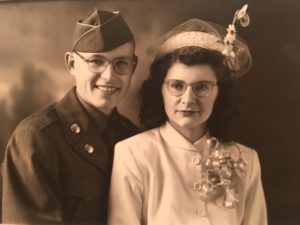
Duane Hannasch
Duane William Hannasch was born on November 24, 1928 in Templeton, Iowa. Soon after the breakout of the Korean War, Duane was drafted. He received his draft notice in January 1951 and was sent to Fort Riley, Kansas for basic training and to serve in the Army’s 3rd Armored Division. His brother and brother in law would also be drafted and eventually deployed. Duane left behind his sweetheart, Anita Koster, but was soon reunited with her after his basic training. Duane and Anita married in Breda, Iowa before he was sent to Fort Meade, Maryland. Duane attended baking school and ended up cooking for the medical training unit in Fort Meade for 6 months. He was eventually shipped to Fort Knox, Kentucky where he served as the cook for the officer mess hall and served over 80 officers on a daily basis. Duane’s two year long service ended in December 1952. He was able to hitchhike rides back home to Iowa and arrive at his family’s farm in time to celebrate his newborn son’s first Christmas. Nearly 70 years later, Duane and his wife, Anita, still remember his dog tag number: US 55076916. They have been blessed with 5 children, 8 grandchildren, and several great grandchildren.
Korean War - Key Events
July 10, 1951
Truce talks between the UN and the communists begin at Kaesŏng. The negotiations do not mark an end to the war, however; the fighting continues for two more years. In October the peace talks relocate to the village of P’anmunjŏm.
These events are taken from the Encyclopedia Britannica

Comments
Likes 0
You must be a registered user to comment or like - please register to join us!